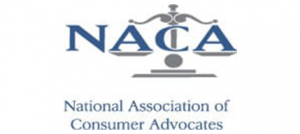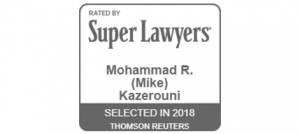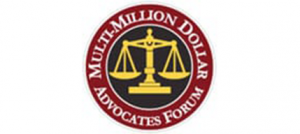California Debt Collection Harassment Lawyer
Dealing with debt collectors can evoke confusion, frustration, and helplessness. When relentless debt collectors pursue you, you feel trapped and overwhelmed.
Blocking their phone number may seem like a solution, but they can be pretty resourceful in finding alternative ways to reach you, sometimes disguising their calls or texts with familiar area codes and prefixes to trick you into responding.
To compound the stress, some debt collectors won’t hesitate to call and ask for you at your workplace, subjecting you to embarrassment and humiliation, exacerbating the anxiety you are already facing.
Debt collectors often rely on people who do not understand their legal rights, but it only takes one harassing phone call or text to cross the line and violate federal and state debt collection laws.
With the assistance of a national debt collector harassment lawyer, you can reclaim control over your life.
Reach out to the Kazerouni Law Group for a free case evaluation to discover how they can stop debt collection harassment.
We are fully prepared to take swift legal action against abusive debt collectors. If you are experiencing debt collector harassment, take immediate action. Contact our California debt collection harassment attorneys today. We can protect your rights and give you peace of mind.
Why Choose Our California Debt Collection Harassment Lawyers?
At Kazerouni Law Group, APC, we’re your dedicated legal partners in fighting against unlawful calls.
With a proven track record of helping to enforce laws that hold companies accountable for their transgressions, there are many reasons you should choose us:

Payment for Unlawful Calls
When unwanted phone calls disrupt your peace and privacy, you have rights; we’re here to help you protect them. You can receive $1,500 in compensation for each illegal phone call.
Free Initial Consultation
We fully comprehend the frustration and inconvenience that comes with these unlawful communications.
Calling us begins the search for justice. We offer a free initial consultation to discuss your case’s details and design the best way to proceed.
Legal Services Based on Contingency
We firmly believe that everyone should have access to top-notch legal representation without the burden of upfront expenses. That’s precisely why we operate on a contingency basis, meaning you’ll only pay legal fees if we successfully secure a favorable outcome for your case. Your peace of mind is our foremost concern.
Proven Successes
Our law firm boasts an impressive track record, having secured over $1 billion in victories for our clients. We have achieved notable successes in landmark cases at the highest courts nationwide.
Through innovative litigation strategies, we have transformed what seemed like impossible cases into triumphs, delivering justice and financial stability to families facing formidable adversaries.
Tailored Personal Support
The Kazerouni Law Group doesn’t delegate our clients to paralegals or inexperienced junior associates. Instead, you will collaborate directly with a seasoned and knowledgeable attorney who will guide you through every phase of your legal journey.
We prioritize building strong client relationships, ensuring your case receives the attention and experience it deserves. These commitments underscore our unwavering dedication to your cause and peace of mind.
Put an End to Disruptive Calls

Do not allow illegal calls to disrupt your life any longer. We are here to prioritize your peace of mind. Act today to safeguard your rights and potentially seek compensation for the inconvenience caused by these frustrating calls.
Give us a call today to discover what makes Kazerouni Law Group different – your trusted partner in the fight against intrusive and illegal phone calls.
We offer two convenient California locations: 245 Fischer Avenue, Suite D1, in Costa Mesa, and 2221 Camino del Rio South, Suite 101, in San Diego.
The Costa Mesa location is right around the corner from St. Monica Coptic Orthodox Church. You can easily find the San Diego office near the Scottish Rite Center of San Diego.
Debt Collector Harassment Laws
The Fair Debt Collection Practices Act (FDCPA) primarily governs debt collector harassment laws and protections in the United States at the federal level. Various state laws may provide additional protections.
Here are some critical aspects of debt collector harassment laws and the protections they offer:
- Prohibited Communication Practices: Debt collectors cannot harass, abuse, or intimidate consumers, including threats of violence, obscene language, and excessive or repeated phone calls intending to annoy or harass.
- Time and Place Restrictions: Debt collectors cannot contact consumers at inconvenient times or places, typically before 8 a.m. or after 9 p.m., unless alternative contact times are available.
- Deceptive Practices: Debt collectors are prohibited from using deceptive or misleading practices, including misrepresenting the amount of the debt, falsely implying they are attorneys, or sending documents that appear to be from a court or government agency when they are not.
- Cease and Desist Requests: Consumers can request that debt collectors cease further communication. Upon receiving such a request in writing, the debt collector can only contact the consumer to acknowledge receipt, notify them of specific actions, or inform them that collection efforts have ceased.
- Validation of Debt: Debt collectors must provide consumers with a written notice containing information about the debt within five days of initial contact, including the amount, the name of the creditor, and the consumer’s rights to dispute the debt. Consumers have 30 days to dispute in writing.
- Privacy Protections: Debt collectors are generally prohibited from discussing your debt with third parties, such as family, friends, or employers unless they have the consumer’s consent or a court order.
- Legal Remedies: Consumers have legal recourse if debt collectors violate the FDCPA or state laws. They can sue the debt collector for damages, including actual, statutory, and attorney’s fees. Government agencies may also act against violators.

Consumers subjected to debt collector harassment should keep records of all statements and refer to an attorney experienced in consumer protection laws to understand their rights and potential courses of action.
Report violations to the Consumer Financial Protection Bureau (CFPB) and the California Attorney General’s office for investigation.
A debt collection lawyer can help you understand these laws, their meaning in your situation, and any options you might have.
Adherence to FCRA Guidelines
The Fair Credit Reporting Act (FCRA) protects the rights of consumers in the United States concerning their credit information.
It controls collecting, sharing, and utilizing consumer credit data, primarily promoting accuracy, fairness, and privacy within credit reporting.
Crucial points:
Addressing Inaccurate Credit Reports: When you find inaccurate information on your credit report, seek the counsel of a qualified California debt collection harassment attorney. It’s the safest way to uphold your rights and explore potential paths for compensation.
Consumer Credit Report Entitlements: Consumers are legally entitled to receive one free credit report annually from each primary credit reporting agency.
Your credit report lets you scrutinize and rectify errors like outdated information or identity theft.
Responsibilities of Businesses in Credit Reporting and Usage: Credit reporting agencies ensure the accuracy and privacy of the credit data they report. Businesses that rely on credit reports to make decisions must operate transparently and secure consumers’ explicit consent.
They must furnish adverse action notices when business decisions adversely affect individuals based on their credit reports. These notices explain the decision-making process, the role of the credit report, and individuals’ rights to dispute inaccuracies.
Legal Consequences for FCRA Non-Compliance: Non-compliance with FCRA regulations carries substantial legal consequences, encompassing the possibility of lawsuits, financial penalties, and criminal charges.

Statutory damages for violations can range from $100 to $1,000 per instance, and businesses may suffer reputational damage and a loss of consumer trust.
Regulatory bodies such as the FTC and CFPB diligently enforce FCRA compliance.
Mandatory Dispute Resolution Protocol: The FCRA says that credit reporting agencies must follow a set way to solve people’s credit information problems. This helps ensure the data is correct and people’s rights are protected.
Some companies are using chatbots (computer programs) to solve these issues, which can be problematic. Chatbots might not always get it right, which could cause problems and make data less secure. Companies collecting debts should ensure people can talk to real humans when they need help.
Best Practices for Sustained Business Compliance: It’s a good idea for businesses to ensure their employees know the rules, keep an eye on how they handle credit information, and have a manual showing they follow the rules. Not having this manual can make businesses more responsible if anything happens.
In simple terms, the FCRA is like a safety net protecting people’s credit information rights. It ensures things are done fairly and ethically in the world of money.
Government Efforts Aren’t Enough
The Telephone Consumer Protection Act (TCPA), The Fair Credit Reporting Act, and other safeguards are irreplaceable tools in fighting against debt collection harassment, but their effectiveness depends on government and private actions.
The FCC is responsible for ensuring the TCPA is followed unless Congress makes changes or the courts get involved. It can punish companies that break the rules by taking enforcement actions.

Some recent cases show how serious these actions can be. The FCC fined two telemarketing companies in Texas a whopping $225 million for making around one billion automatic calls to consumers.
DISH Networks also had to pay a hefty penalty of $215 million for breaking TCPA rules related to these calls, the largest fine ever for a single TCPA violation.
These cases show that the government is really trying to stop creditor harassment. But there’s an important thing to know – any money collected as fines goes into the United States Treasury, not to the people bothered by the harassment.
Filing a Lawsuit for Financial Compensation
You must take direct action to secure financial compensation for the inconvenience caused by harassing calls. They will continue to plague you until you do. The first step is initiating a legal process, a journey that the experienced legal team at Kazerouni Law Group is well-equipped to guide you.

Here’s what you need to know:
- You Can Take Action: The TCPA gives you the power to enforce the law if you’ve been affected by harassing calls. Our team can assist you in using this power effectively. Even if you’re unfamiliar with holding companies accountable for TCPA violations, we have the knowledge and experience to help.
- Lawsuits Usually Involve Many People: TCPA lawsuits often involve many people coming together in a single legal action, making things more efficient and convenient because it prevents the legal system from getting overwhelmed with thousands of individual cases about the same issue.
- We’re Here to Help You: Don’t let illegal badgering calls disrupt your life without consequences. You have rights, and protecting your peace is one of them. The Kazerouni Law Group is here to assist you. We’ll ensure that companies breaking the law are held responsible and that you receive the compensation you deserve.
Contact us today to discuss your concerns and start the journey toward justice, peace, and serenity.
Contact Our Debt Collection Harassment Lawyers at Kazerouni Law Group

Our team is ready to stand by your side if you have issues with harassing creditors. At Kazerouni Law Group, our debt defense attorneys offer nationwide assistance.
Are you facing constant harassment and not even sure you have unpaid debt? Already have a payment plan and still getting several calls every day?
Our California consumer protection attorneys have the experience and resources to safeguard your rights and offer solid legal advocacy.
Contact our California debt collection harassment lawyers at (800) 400-6808 or online for a complimentary consultation and learn how we can help you today. Creditor harassment is unnerving and harmful. We can stop it.





